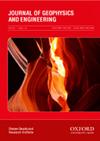通过属性迁移和受约束最小二乘反演进行反向时间迁移地表偏移采集
IF 1.7
3区 地球科学
Q3 GEOCHEMISTRY & GEOPHYSICS
引用次数: 0
摘要
地表偏移采集(SOG)对于地震数据迁移中的速度更新和减弱迁移地震数据浅部的拉伸波形至关重要。基于 Kirchhoff 的迁移方法可以输出 SOG,因为它将每条地震道作为输入。因此,可以根据输入数据的偏移值重新排列成像结果,从而获得 SOG。然而,对于更精确的波方程方法(如反向时间迁移(RTM)),一次迁移计算无法直接获得 SOG。属性迁移是输出波方程迁移方法 SOG 的一种易于实施的方法。它通过将偏移属性调制的迁移结果与常规迁移结果相除来计算每个成像点的偏移值。然而,除法误差可能导致计算结果超出给定偏移值。本文提出了一种用于稳定计算 RTM 偏移范围的受限最小平方反演方法。该方法可确保计算结果在给定的偏移范围内。我们使用 Marmousi 模型和真实三维数据集测试了该方法与直接除法和无约束最小平方法的比较。结果表明,采用约束最小二乘法反演属性迁移方法得到的 SOG 与采用基于除法的属性迁移方法得到的 SOG 具有相同的特征,而且具有更高的垂直分辨率、更好的能量分布和更好的横向连续性。在进一步的研究中,我们希望开发出一种稳定而直接的方法来有效计算 RTM 的 SOGs,并开发出 RTM 速度更新的迭代闭环。本文章由计算机程序翻译,如有差异,请以英文原文为准。
Reverse time migration surface offset gathers by attribute migration and constrained least squares inversion
Surface offset gathers (SOGs) are crucial in velocity updating in seismic data migration and muting the stretched waveform in shallow parts of migrated seismic data. Kirchhoff-based migration methods can output SOGs because it takes every seismic trace as the input. As a result, the imaging results can be rearranged according to the offset value of the input data to obtain SOGs. However, regarding more accurate wave equation methods (such as reverse time migration (RTM)), the SOGs cannot be obtained directly with a single migration calculation. Attribute migration is an easy-to-implement method to output SOGs of wave equation migration methods. It calculates the offset value of each imaging point by dividing the migration result modulated by the offset attribute with the conventional migration result. However, the division error may cause the calculation result outside the given offset value. This paper proposes a constrained least square inversion method for stable calculation of RTM offset range. The method ensures that the calculated results are within the given offset range. We tested the method against the direct division and least square methods without constraints using the Marmousi model and real 3D dataset. We show that the SOGs obtained by the constrained least squares inversion attribute migration method had the same characteristics as those derived using the division-based attribute migration method, but also has higher vertical resolution, better energy distribution, and improved lateral continuity. In further study, we expect to develop a stable and direct method to efficiently calculate SOGs for RTM and an iterative closed loop for RTM velocity updating.
求助全文
通过发布文献求助,成功后即可免费获取论文全文。
去求助
来源期刊

Journal of Geophysics and Engineering
工程技术-地球化学与地球物理
CiteScore
2.50
自引率
21.40%
发文量
87
审稿时长
4 months
期刊介绍:
Journal of Geophysics and Engineering aims to promote research and developments in geophysics and related areas of engineering. It has a predominantly applied science and engineering focus, but solicits and accepts high-quality contributions in all earth-physics disciplines, including geodynamics, natural and controlled-source seismology, oil, gas and mineral exploration, petrophysics and reservoir geophysics. The journal covers those aspects of engineering that are closely related to geophysics, or on the targets and problems that geophysics addresses. Typically, this is engineering focused on the subsurface, particularly petroleum engineering, rock mechanics, geophysical software engineering, drilling technology, remote sensing, instrumentation and sensor design.
 求助内容:
求助内容: 应助结果提醒方式:
应助结果提醒方式:


